| Listing 1 - 10 of 10 |
Sort by
|
Book
Abstract | Keywords | Export | Availability | Bookmark
 Loading...
Loading...Choose an application
- Reference Manager
- EndNote
- RefWorks (Direct export to RefWorks)
Linguistics --- Speech therapy --- Linguistic analysis (Linguistics) --- Functionalism (Linguistics) --- Linguistique --- Orthophonie --- Analyse linguistique (Linguistique) --- Fonctionnalisme (Linguistique) --- Study and teaching. --- Study and teaching. --- Etude et enseignement --- Etude et enseignement
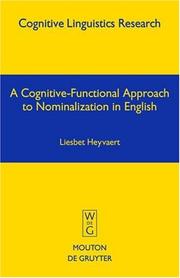
ISBN: 3110178095 3110903709 9783110178098 Year: 2003 Volume: 26 Publisher: Berlin Mouton de Gruyter
Abstract | Keywords | Export | Availability | Bookmark
 Loading...
Loading...Choose an application
- Reference Manager
- EndNote
- RefWorks (Direct export to RefWorks)
The book presents a systematic theoretical account of the fundamental constructional mechanisms that underlie deverbal nominalization in general, and it makes an original descriptive contribution by discussing a number of nominalization systems in detail. The main theoretical motif is that nominalization strongly calls for a functional rather than purely structural approach. The book goes more deeply into a number of functional constructs needed to model nominalization (drawn from Cognitive Grammar and Systemic-Functional Grammar) and it elaborates on the internal functional organization of nominal and clausal structure [e.g. the notions of type specification, instantiation and grounding (Langacker 1991) are discussed in detail and shown to be crucial for the analysis of deverbal nominalization]. It is argued that deverbal nominalizations are basically re-classifications of verbal predicates into nominal constructions. This re-classification either applies at word rank or it involves the rank shift (Halliday 1966) of a clause-like unit, with its internal structure preserved (e.g. signing the contract quickly). The re-classified unit then adopts a specific nominal strategy, with some form of nominal determination and quantification (e.g. her signing the contract quickly). The descriptive part of the book zooms in on nominalizations that are derived at word rank (deverbal -er nominals) and on nominalizations applying to 'a temporal clausal heads' (e.g. John's playing the piano) and finite clauses. Of the gerundive and finite types of nominalization, those that function in factive contexts are focused on. In the analysis of deverbal -er nominals a case is made for a 'subject' analysis of the system and an elaborate discussion of the clausal middle construction (e.g. this book reads easily) - which is argued to show systematic resemblances with non-agentive -er nominals - is included. Of the remaining nominalization types (John's playing the piano; playing the piano; the fact that he plays the piano; that he plays the piano ), especially the nominal behaviour (e.g. proper name vs. common noun strategy) and (in the case of gerundive nominals) the various structural and semantic subtypes that can be distinguished among them are discussed.
Psycholinguistics --- English language --- Grammar --- Functionalism (Linguistics) --- Cognitive grammar --- Nominals --- Academic collection --- Theses --- Cognitive grammar. --- Nominals. --- Functionalism (Linguistics). --- Cognitive linguistics --- Grammar, Comparative and general --- Functional analysis (Linguistics) --- Functional grammar --- Functional linguistics --- Functional-structural analysis (Linguistics) --- Grammar, Functional --- Grammatical functions --- Linguistics --- Structural linguistics --- Germanic languages --- English language - Nominals --- Acqui 2006
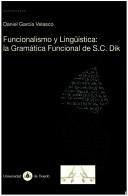
Abstract | Keywords | Export | Availability | Bookmark
 Loading...
Loading...Choose an application
- Reference Manager
- EndNote
- RefWorks (Direct export to RefWorks)
Fonctionalisme (Linguistique) --- Functionalism (Linguistics) --- Functionalisme (Taalwetenschap) --- Generatieve spraakkunst --- Generative grammar --- Grammaire générative --- Grammaire transformationnelle --- Grammar [Comparative and general ] -- Derivation --- Grammar [Generative ] --- Grammar [Transformational ] --- Grammar [Transformational generative ] --- Grammatica [Generatieve ] --- Grammatica [Transformationele ] --- Spraakkunst [Generatieve ] --- Spraakkunst [Transformationele ] --- Transformational generative grammar --- Transformational grammar --- Transformationele grammatica --- Transformationele spraakkunst --- Transformationele taaltheorie --- Grammar, Comparative and general. --- Functionalism (Linguistics). --- Dik, Simon C. --- Criticism and interpretation
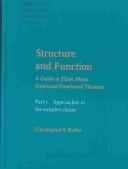
ISSN: 01657763 ISBN: 9027230749 1588113612 9027230730 1588113604 9027230692 9027230706 9027230714 9027230722 9781588113603 9781588113610 1588113566 9781588113566 1588113574 9781588113573 9789027296535 9027296537 1282161253 9786612161254 1588113582 9786612161247 1282161245 9027296529 9789027230713 9789027230706 9789027230720 9789027230737 9789027230690 9789027230744 9789027296528 1588113590 Year: 2003 Volume: 63, 64 Publisher: Amsterdam Benjamins
Abstract | Keywords | Export | Availability | Bookmark
 Loading...
Loading...Choose an application
- Reference Manager
- EndNote
- RefWorks (Direct export to RefWorks)
Like its companion volume, this book offers a detailed description and comparison of three major structural-functional theories: Functional Grammar, Role and Reference Grammar and Systemic Functional Grammar, illustrated throughout with corpus-derived examples from English and other languages. Whereas Part 1 confines itself largely to the simplex clause, Part 2 moves from the clause towards the discourse and its context. The first three chapters deal with the areas of illocution, information structuring (topic and focus, theme and rheme, given and new information, etc.), and clause combining within complex sentences. Chapter 4 examines approaches to discourse, text and context across the three theories. The fifth chapter deals with the learning of language by both native and non-native speakers, and applications of the theories in stylistics, computational linguistics, translation and contrastive studies, and language pathology. The final chapter assesses the extent to which each theory attains the goals it sets for itself, and then outlines a programme for the development of an integrated approach responding to a range of criteria of descriptive and explanatory adequacy.
Lexicology. Semantics --- Psycholinguistics --- Comparative linguistics --- Grammar --- Structural linguistics --- Functionalism (Linguistics) --- Role and reference grammar --- Systemic grammar --- Functionalism (Linguistics). --- Role and reference grammar. --- Structural linguistics. --- Systemic grammar. --- 801.56 --- 801.56 Syntaxis. Semantiek --- Syntaxis. Semantiek --- Philology & Linguistics --- Languages & Literatures --- Neo-Firthian linguistics --- Scale-and-category grammar --- System-structure grammar --- Systemic linguistics --- Grammar, Comparative and general --- Linguistic analysis (Linguistics) --- Functional analysis (Linguistics) --- Functional grammar --- Functional linguistics --- Functional-structural analysis (Linguistics) --- Grammar, Functional --- Grammatical functions --- Linguistics
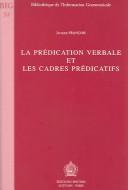
ISBN: 904291372X 2877237524 9789042913721 9782877237529 Year: 2003 Volume: 54 Publisher: Louvain Peeters
Abstract | Keywords | Export | Availability | Bookmark
 Loading...
Loading...Choose an application
- Reference Manager
- EndNote
- RefWorks (Direct export to RefWorks)
French language --- Grammar --- Functionalism (Linguistics) --- Grammar, Comparative and general --- Semantics --- Causative (Linguistics) --- Verb phrase --- Functional and reference grammar --- Semantics. --- Verb phrase. --- Functional and reference grammar. --- Causative (Linguistics). --- Functionalism (Linguistics). --- Formal semantics --- Semasiology --- Semiology (Semantics) --- Comparative linguistics --- Information theory --- Language and languages --- Lexicology --- Meaning (Psychology) --- Predicate (Grammar) --- Functional analysis (Linguistics) --- Functional grammar --- Functional linguistics --- Functional-structural analysis (Linguistics) --- Grammar, Functional --- Grammatical functions --- Linguistics --- Structural linguistics --- Causal relations (Linguistics) --- Phrasal verb --- Predicate --- Verbals --- Causative constructions --- Syntax --- Philology --- Grammar, Comparative and general - Verb phrase
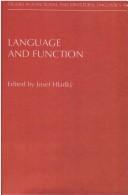
ISBN: 9027215588 1588113035 9786612161384 1282161385 9027296731 9789027296733 9789027215581 9781588113030 9781282161382 6612161388 Year: 2003 Volume: 49 Publisher: Amsterdam Philadelphia J. Benjamins Pub. Co.
Abstract | Keywords | Export | Availability | Bookmark
 Loading...
Loading...Choose an application
- Reference Manager
- EndNote
- RefWorks (Direct export to RefWorks)
The present volume, originally prepared to celebrate Jan Firbas' 80th birthday, unfortunately is presented only belatedly, to commemorate one of the most outstanding personalities of functional and structural linguistics. Its contributors have been inspired by the richness and penetrating invention of Firbas, contained in his analysis of functional sentence perspective and of many other aspects of sentence and discourse.
Functionalism (Linguistics). --- Grammar, Comparative and general --- Topic and comment. --- Fonctionalisme (Linguistique) --- Functionalism (Linguistics) --- Functionalisme (Taalwetenschap) --- -Functional analysis (Linguistics) --- Functional grammar --- Functional linguistics --- Functional-structural analysis (Linguistics) --- Grammar, Functional --- Grammatical functions --- Linguistics --- Structural linguistics --- Comparative grammar --- Grammar --- Grammar, Philosophical --- Grammar, Universal --- Language and languages --- Philosophical grammar --- Philology --- Topic and comment --- Grammar, Comparative --- Firbas, Jan --- Functional analysis (Linguistics) --- Functional sentence perspective (Grammar) --- Predicate and subject (Grammar) --- Subject and predicate (Grammar) --- Theme and rheme --- Topic and comment (Grammar) --- Focus (Linguistics) --- Subject and predicate --- Syntax --- Firbas, Jan. --- Grammar [Comparative and general ] --- Grammar, Comparative and general -- Topic and comment. --- Languages & Literatures --- Philology & Linguistics

ISBN: 9042010053 9004334408 Year: 2003 Publisher: Amsterdam Rodopi
Abstract | Keywords | Export | Availability | Bookmark
 Loading...
Loading...Choose an application
- Reference Manager
- EndNote
- RefWorks (Direct export to RefWorks)
Academic collection --- #KVHA:Taalkunde; Spaans --- #KVHA:Cognitieve linguïstiek; Spaans --- Psycholinguistics --- Spanish language --- Cognitive grammar. --- Functionalism (Linguistics) --- Functional analysis (Linguistics) --- Functional grammar --- Functional linguistics --- Functional-structural analysis (Linguistics) --- Grammar, Functional --- Grammatical functions --- Linguistics --- Structural linguistics --- Cognitive linguistics --- Grammar, Comparative and general --- Discourse analysis.
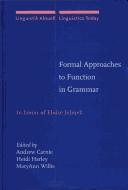
ISBN: 9027227853 1588113485 9027296901 1282255460 1423761332 9786612255465 9781423761334 9781588113481 9789027227850 Year: 2003 Volume: 62 Publisher: Amsterdam Benjamins
Abstract | Keywords | Export | Availability | Bookmark
 Loading...
Loading...Choose an application
- Reference Manager
- EndNote
- RefWorks (Direct export to RefWorks)
The contributions making up this volume in honor of Eloise Jelinek are written from a formalist perspective that deals with stereotypically functionalist questions about language. Jelinek's pioneering work in formalist syntax has shown that autonomous syntax need not exist in a vacuum. Her work has highlighted the importance of incorporating the effects of discourse and information structure on the syntactic representation. This book aims to invoke Jelinek's work either in substance or spirit. The focus is on Jelinek's influential Pronominal Argument Hypothesis as an "non-configurational" language; the influence of discourse-related interface phenomena on syntactic structure; the syntactic analysis of the grammaticalization; interactions between morphology, phonology and phonetics; and foundational issues about the link between formal grammar and function of language, as well as the methodological issues underlying the different approaches to linguistics.
Fonctionalisme (Linguistique) --- Functionalism (Linguistics) --- Functionalisme (Taalwetenschap) --- Grammaire comparée et générale --- Grammaire générale --- Grammaire générale et comparée --- Grammaire philosophique --- Grammaire universelle --- Grammar [Comparative and general ] --- Spraakkunst [Vergelijkende en algemene ] --- Comparative linguistics --- Grammar --- Grammar, Comparative and general. --- Functional analysis (Linguistics) --- Functional grammar --- Functional linguistics --- Functional-structural analysis (Linguistics) --- Grammar, Functional --- Grammatical functions --- Linguistics --- Structural linguistics --- Philology
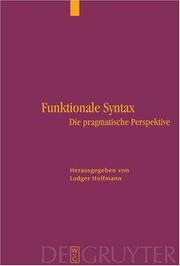
ISBN: 3110176319 Year: 2003 Publisher: Berlin De Gruyter
Abstract | Keywords | Export | Availability | Bookmark
 Loading...
Loading...Choose an application
- Reference Manager
- EndNote
- RefWorks (Direct export to RefWorks)
Functionalism (Linguistics) --- Grammar, Comparative and general --- Pragmatics --- Pragmalinguistics --- General semantics --- Language and languages --- Logic, Symbolic and mathematical --- Semantics (Philosophy) --- Functional analysis (Linguistics) --- Functional grammar --- Functional linguistics --- Functional-structural analysis (Linguistics) --- Grammar, Functional --- Grammatical functions --- Linguistics --- Structural linguistics --- Syntax --- Philosophy --- Grammar --- German language --- Philology --- Grammar, Comparative and general Syntax

ISBN: 1575862867 1575862859 9781684000548 9781684000555 9781684000579 9781684000562 1684000564 1684000548 Year: 2003 Publisher: Stanford (Calif.) CSLI
Abstract | Keywords | Export | Availability | Bookmark
 Loading...
Loading...Choose an application
- Reference Manager
- EndNote
- RefWorks (Direct export to RefWorks)
Lexicology. Semantics --- Grammar --- 801.56 --- Syntaxis. Semantiek --- Linguistics. --- 801.56 Syntaxis. Semantiek --- Construction grammar --- Case grammar --- Functionalism (Linguistics) --- Linguistics --- Functional analysis (Linguistics) --- Functional grammar --- Functional linguistics --- Functional-structural analysis (Linguistics) --- Grammar, Functional --- Grammatical functions --- Structural linguistics --- Discourse analysis --- Pragmatics --- Linguistic science --- Science of language --- Language and languages --- Grammar, Case --- Grammar, Comparative and general --- Case --- Syntax --- Pragmalinguistics --- General semantics --- Logic, Symbolic and mathematical --- Semantics (Philosophy) --- Discourse grammar --- Text grammar --- Semantics --- Semiotics --- Philosophy
| Listing 1 - 10 of 10 |
Sort by
|

 Search
Search Feedback
Feedback About UniCat
About UniCat  Help
Help News
News